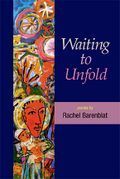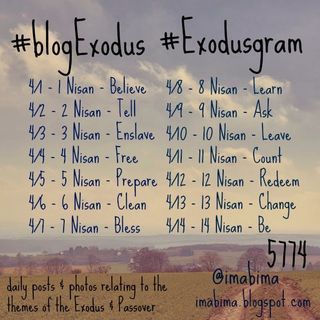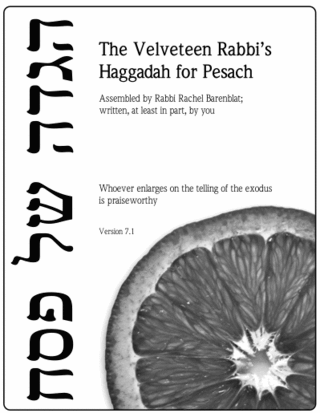Rachel Barenblat's Blog, page 162
April 6, 2014
Weekend Shabbaton, poetry reading, and master class on City Island
I'm going to Temple Beth-El of City Island at the end of this month as a Scholar-In-Residence! While I'm there, I'll be participating in Shabbat services (both evening and morning), offering some teaching, reading poetry, and teaching a class. Below is some information from them (also mirrored on their website). If you're in or near New York, I hope you'll join us!
Shabbaton, Poetry Reading, & Master Class on City Island during the last weekend in May
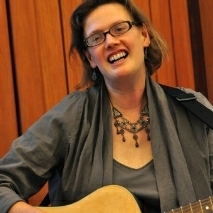 Nationally recognized rabbi, poet and blogger Rachel Barenblat, the Velveteen Rabbi, will hold a special shabbaton weekend as TBE’s Scholar in Residence, May 30 – June 1, 2014. This amazing weekend will include music-filled services, special teachings, and public readings/symposia of Rabbi Rachel’s works. Especially known for spiritual writing and re-imagining the lives of families and especially women for the 21st century, Rabbi Rachel is an accomplished author of numerous books of spiritual poetry, and has been named by Time Magazine as among the 25 top bloggers on the Internet.
Nationally recognized rabbi, poet and blogger Rachel Barenblat, the Velveteen Rabbi, will hold a special shabbaton weekend as TBE’s Scholar in Residence, May 30 – June 1, 2014. This amazing weekend will include music-filled services, special teachings, and public readings/symposia of Rabbi Rachel’s works. Especially known for spiritual writing and re-imagining the lives of families and especially women for the 21st century, Rabbi Rachel is an accomplished author of numerous books of spiritual poetry, and has been named by Time Magazine as among the 25 top bloggers on the Internet.
Shabbat, May 30-31
Fri. May 30 7:30 pm Musical Shabbat with Your Band by the Sea
Sat. May 31 10:00 am Shabbat Morning Services
12:00 pm Public Teaching: The Power of Blessing
Sunday, June 1
Sun. June 1 10:30 am Master Class: Writing in Spiritual Life
12:00 pm Public Reading and Author Q&A
Friday and Saturday services / teaching at Temple Beth-El, 480 City Island Avenue
Sunday sessions at Samuel Pell House, 586 City Island Ave
( writing class: $20 for non-members, bring a notebook or laptop and an open heart)
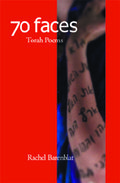 Praise for 70 faces (Phoenicia Publishing 2011)
Praise for 70 faces (Phoenicia Publishing 2011)
Rachel Barenblat’s Torah poems open the doorway into sacred text so that we can walk in and make it our home. She invites us to bring all of our passion, doubt, humor, humility and chutzpah as we encounter these ancient words and bring them to Life. Through Rachel’s skillful, joyful, playful and profound poetry, the Torah opens her secrets to us and invites us into an intimate conversation with Truth.
—Rabbi Shefa Gold, Torah Journeys
These poems are so out there, so radical, and at the same time so gentle and inviting. Barenblat manages to do work that has passion and truth behind it, without ranting. I love the final poem in this collection – gliding right past heartbreak into renewal.
—Alicia Ostriker, The Book of Seventy
Praise for Waiting to Unfold (Phoenicia 2013)
These rich poems will carry you into the great timeless miracle and mystery of unfolding littleness, nonstop maternal alertness, beauty and exhaustion and amazing, exquisite tenderness, oh yes.
—Naomi Shihab Nye, The Words Under the Words
The intense observation of the poet and intense observation of the mother unite in a celebration of what is new and newborn, what is intensely felt and cherished and what is lost and mourned. Barenblat’s poems are easy to enter into, and they carry both the uniqueness of her persona as poet and serious Jew and the universality of love that has made us all. The holy is in the everyday, as our best American poets have taught us, and as Barenblat teaches us in a new way.
—Rodger Kamenetz, The Jew in the Lotus
Daily April poem - inspired by what's outside the window
SUNDAY AFTERNOON
Bare branches splay across egshell sky
inviting the tiny caress of squirrel feet,
the sharp peck of a bird, seeking.
Parked cars rest, awaiting orders.
Electricity races invisibly
through unmoving power lines.
Rooftops have shed their winter coats.
Skylights blink owlishly at the sun,
unaccustomed to exposure.
And at the horizon, hills
the muted purple of sugared gumdrops
waiting to be popped into my mouth.
Today's NaPoWriMo prompt invites us to look outside the window, record nouns and verbs and colors, and then weave them into a poem. This is my result -- both a description of what I see outside the window, and an encapsulation of the kind of quiet stillness which can come over a residential neighborhood on a Sunday afternoon.
#blogExodus and Metzora: plagues, cleansing, and Pesach house-cleaning
Here's the d'var Torah I offered at my shul yesterday morning for parashat Metzora. (Cross-posted to my From the Rabbi blog.) I'm also posting this as a contribution to #blogExodus, for today's prompt "Clean."
In this week's Torah portion we read instructions for what to do if an eruptive plague arises on someone's house. What does it mean to say that a house is afflicted by a plague, or something like a plague?
The description in the Torah text suggests that the plague is akin to mold, described like a disease in the walls. It is as though the house itself were alive and susceptible to infection. We could imagine that this Torah portion speaks merely of this kind of problem: when your house has termites, call the exterminator -- when your house has leaks, call the roofer -- when your house sprouts mold, call the priest.
But I think there's something deeper here. What did William Shakespeare mean when his character Mercutio cursed, "a plague on both your houses"? For Shakespeare, a house meant a household, a family. If we read the Torah portion through this lens, the stakes are higher.
Sometimes, Torah says, a house needs to be scraped clean and then plastered again. And sometimes, even that isn't enough -- it's a kind of mere whitewashing, and given opportunity, the problem will erupt again.
As we prepare to gather with our families and friends around the seder table, what are the places where our "house" needs to be scraped clean and then replastered? What's the old emotional stuff we want to scrub away? Are we willing to do the work of removing what's encrusted on the surface of our family relationships, and to expose what lies beneath?
In our broader community, what are the places where a plague has grown too deep -- where merely cutting out a few problematic pieces won't stem its spread, and we need to destroy the structure and build anew? Maybe it's the plague of racism, or the plague of militarism, or the plague of ignoring someone else's narrative or point of view. Are we willing to tear down what no longer serves us in order to build something different, something as-yet unknown?
At this season many of us are engaging in literal housecleaning. Maybe it's that impulse toward spring cleaning which arises when the temperatures start to hover well above freezing. Maybe it's the old pre-Pesach tradition of scouring every surface and getting ready to relinquish our hametz, our leaven, which the Hasidic tradition says can represent the puffery of ego.
As you clean for Pesach, consider this other kind of housecleaning, too. What behaviors or habits or patterns do you want to place in quarantine? What emotional dynamics in your household do you want to scrub away in order to meet the season of our liberation fresh and new?
April 5, 2014
Daily April poem: a "golden shovel"
AT THE WALL
The same molded plastic chairs, there 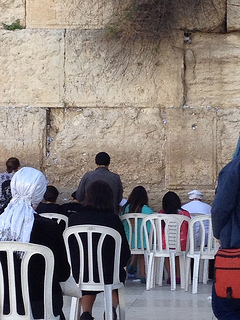
as everywhere: in this way it is
like the nearby market stalls, though nothing
is bought or sold. We come to pray, to
pour out our hearts. Look,
on the men's side they leap for joy, at
ease with their voices. Here any
vocalization is quiet, more
a whisper than a cry. Everything
I want to say to God blocks my words. Has
She noticed how her children have been
at each other's throats? When I've seen
enough I back away and return to
where once a carpenter faced his death.
Today's prompt at NaPoWriMo is to write a "golden shovel," a form invented by Terrance Hayes. The way it works is this: take a short poem; break it up so that each word is its own line; and then write a new poem in which those are the end-words.
I chose a short poem called "Tourists" by DH Lawrence. (You can read it by reading the last word on each line of my poem, from top to bottom. Or you can find it on this list of poems for people with short attention spans.)
There's a custom of departing from the Kotel (also known as the Western Wall) by walking backwards, rather than turning one's back on the holy place. It is only a short walk from there to the Via Dolorosa.
Photo source is my own photostream again.
#blogExodus 5: Prepare
At this time of year a lot of energy goes toward preparations. 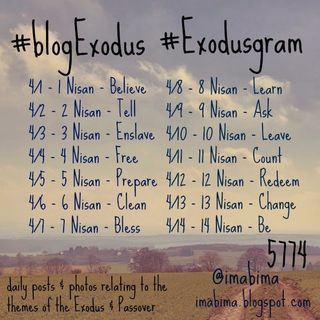 At my synagogue, emails are flying fast and furious about our second-night community seder: do we have enough flatware? How about coffee urns? Who's going to take care of the synagogue's movable walls, and of setting up tables for the seder?
At my synagogue, emails are flying fast and furious about our second-night community seder: do we have enough flatware? How about coffee urns? Who's going to take care of the synagogue's movable walls, and of setting up tables for the seder?
Meanwhile, I'm thinking: do we have enough haggadot? Do I want to bring any new melodies this year? How can I best weave in the kids who are going to act out the Exodus story as part of our Maggid / Storytelling part of the service? Do I have a sitter who can take care of our son at the seder so I don't have to worry about what he's getting into while I'm leading?
One of my favorite teachings about the Exodus story comes from the Hasidic rabbi Nachman of Bratzlav. (I wrote about it a few years ago: On leaping, without delay.) He's talking about the need, when one is leaving Mitzrayim / the Constricted Place, to leap quickly without delay. In my haggadah, one of the ways I frame that is "if we wait until we feel fully ready, we might never take the leap at all."
Preparations are important. I wouldn't want to lead a seder without spending some time with the haggadah; I wouldn't want to host a seder without doing the cooking first; I wouldn't want to approach Pesach without doing at least some of the cleaning work, both physical and spiritual, which is required! But at a certain point, no matter how prepared we do or don't feel, we have to take the leap into what's next. It's like preparing to be a parent: no matter how long you spend getting ready for that adventure, when the adventure begins, it's going to take you places you never imagined. One of the things I try to learn from parenthood is that it's good for me to prepare -- and it's even better for me to know when and how to relinquish my preparations for what I expected and savor what is, instead.
This post is part of #blogExodus, a daily carnival of posts / tweets / status updates relating to themes of Passover and Exodus, created by ImaBima. Find other posts via the #blogExodus hashtag.
April 4, 2014
#blogExodus 4: Free
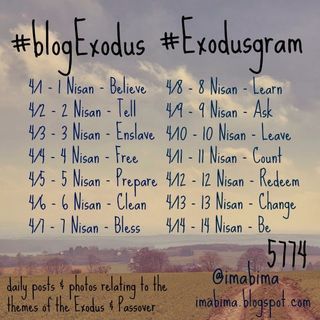 We're one day closer to Pesach. One day closer to celebrating our freedom from slavery in Mitzrayim.
We're one day closer to Pesach. One day closer to celebrating our freedom from slavery in Mitzrayim.
Usually that name is rendered as "Egypt," but it means "The Narrow Place."
What are the narrow places from which you need to be freed?
The narrow places of prejudice and preconception?
The narrow places of old habits which no longer serve?
The narrow places of not letting yourself change?
Tradition says we cried out to God from our constriction and God heard our cry.
This is what our tradition calls hit'oreruta dil'tata, "arousal from below."
Our outpouring of desperate yearning caused God to respond.
In that sense, we instigated our own Exodus. We cried out, and God heard us.
What do you need to cry out in order to begin the journey toward freedom?
What would it feel like to cry out, and to know that God has heard you?
What would it feel like to give yourself permission to break free from all of your narrow places: the ones you've imposed on yourself, the ones imposed by others' expectations -- to really and truly know that it is possible to be redeemed from those constrictions?
What would it feel like, this Pesach, to really become free?
This post is part of #blogExodus, a daily carnival of posts / tweets / status updates relating to themes of Passover and Exodus, created by ImaBima. Find other posts via the #blogExodus hashtag.
Daily April poem: a series of lunes
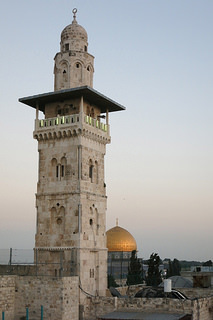 WAKE-UP CALL
WAKE-UP CALL
Four-thirteen AM:
the call to prayer glides
into my ear.
God is greatest!
Another voice joins the song
point and counterpoint.
I bear witness
that there is no other
God but God!
Handful of stones
thrown into a still pond
make intersecting ripples.
In my bed
I think: hear, O Israel --
God is One.
When I sing
morning prayers I will remember
this sharp yearning.
One by one
the loudspeakers cease crying out.
Listen: church bells.
The day four prompt at NaPoWriMo is to write a lune, a three-line poem intended to do in English what a haiku does in Japanese. They suggested that we work with the form developed by Jack Collum, which features stanzas of three words, five words, three words.
Just last week I was in Jerusalem marveling at the early-morning sounds of the Old City (see Staying somewhere new). That's what sparked this poem. (The photo accompanying the poem is my own.)
You can read about the adhān here at Wikipedia.
"Hear, O Israel -- God is One" is a slight abbreviation of the shema.
April 3, 2014
#blogExodus day 3: Enslave
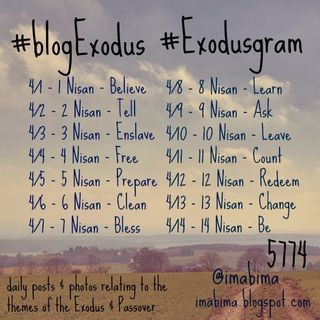 My friends and colleagues at Romemu made the news recently for their publicly-announced decision to spend the days of Pesach free from the hametz of email. Hametz means leaven. In one popular Hasidic understanding the idea of cleansing one's home of literal leaven (which is to say: getting rid of the bread products and so forth) is transmuted into the idea of cleansing one's soul of metaphorical leaven. The hametz of ego, of puffery and pride. The leap from there to email is an intriguing one.
My friends and colleagues at Romemu made the news recently for their publicly-announced decision to spend the days of Pesach free from the hametz of email. Hametz means leaven. In one popular Hasidic understanding the idea of cleansing one's home of literal leaven (which is to say: getting rid of the bread products and so forth) is transmuted into the idea of cleansing one's soul of metaphorical leaven. The hametz of ego, of puffery and pride. The leap from there to email is an intriguing one.
I find myself wondering whether email -- and the internet writ large -- is a thing to which we are sometimes enslaved. That's a strong word, I know. And usually it's not a term I would use. I rationalize that I come to the internet to communicate with friends and loved ones, and to read and write and converse about Judaism and the festival cycle and healing the world. These are lofty aspirations! On my best days, the internet is a tool which helps me connect.
But I know that sometimes the digital world gets its hooks into me in an unhealthy way. Who among us hasn't known the twitchy temptation to check email / Twitter / Facebook one more time, to make sure that we're not missing anything in anyone's life? Last summer during my week of vacation with my family, I had trouble staying away from high-holiday-related emails. "It's important," I rationalized. "The holidays are so early this year." But did any of those emails really require me to read them right that instant -- couldn't they have waited until I got home? When does the internet become a distraction from the life that's unfolding all around us, and from the holiness which we might find in that life?
That was part of what I was thinking about when I wrote Tele/Presence a few years ago:
I want your presence
twined around my forearm
when I snap open the Times
when I fret over trending topics
when I dream in status updates
scrolling endlessly...
(That poem, lightly revised, will be in my forthcoming collection Open My Lips, due later this year from Ben Yehuda Press.) Maybe when I'm online with awareness of divine presence, that awareness helps me transmute the possibility of enslavement into something redemptive instead. Enslavement is closed, constricted, possibilities shut-off. But the story of this season is the story of moving from slavery to freedom: from closed to open, from channels blocked to open conduits through which blessing can flow.
I think a lot at this time of year about the distinction between slavery and service. At Pesach we commemorate leaving slavery; fifty days later, at Shavuot, we celebrate entering into service. We didn't leave slavery in order to be purely on our own, devoid of obligations and responsibilities. We traded slavery to Pharaoh for service to God. In both cases, we acknowledge that there's a force greater than ourselves. But Pharaoh is the force of power-over; God is the source of power-from-within.
Enslavement means not having a choice. It means being owned. Service, in contrast, means choosing to place ourselves in covenantal relationship. I serve my congregation. I serve my community. I (aspire to) serve God.
When I allow my need for one more metaphorical pellet, one more email check-in, one more glance at the computer, to control me -- then I'm enslaved. When I allow myself the delusion that people need me to answer every single email that comes in, instantly, no matter what time of day or night, no matter whether weekday or Shabbat -- then I'm enslaved. That's when the internet becomes hametz, food for my ego, for the part of me which wants to persist in believing that my response is so critical that no one can get by without me. But when I choose to connect with intentionality and prayerful consciousness, with compassion, and with the good boundaries and good sense to unplug from time to time, then the internet becomes another way I can serve.
This post is part of #blogExodus, a daily carnival of posts / tweets / status updates relating to themes of Passover and Exodus, created by ImaBima. Find other posts via the #blogExodus hashtag.
Daily April poem: "faces in the street"
STRANGER
he doesn't meet my glance, the man
whose tallit is draped like wings
on his way to morning prayer
on my first day back
when I walk round-eyed
into the old neighborhood, greeting
the grandkittens of the feral cats
the three-year-old used to feed
these limestone buildings
are my minyan, witnessing
my murmured prayer of gratitude
for years of absence, and for return
Today's poem was written to a prompt at 3030 poetry -- "faces in the street." It comes out of the experience of waking early, my first morning in Jerusalem, and going for a walk to my old street before breakfast. I love seeing people walking to Shabbat morning prayer with their tallitot flying behind them in the breeze. That never happens where I live, so it's a sight I associate entirely with Jerusalem. I struggled a bit to find the right title for this poem, and settled on "stranger" -- hoping it would reflect both the man in the poem, and the narrator of the poem, which is to say, me.
VR Haggadot
Pesach is approaching! If you're looking for a haggadah, allow me to humbly recommend the Velveteen Rabbi's Haggadah for Pesach, which exists in two versions: one which is 48 pages long, one which is 84 pages long.
You can find both versions (downloadable PDF files), and can see some of what others have had to say about the haggadah, on the VR Haggadah page of my website.
Here's more information about version 7.1 (2011); here's more information about version 7.2 (2012.) Use it in good health! And, as always, I welcome feedback of all kinds.
Rachel Barenblat's Blog
- Rachel Barenblat's profile
- 6 followers


